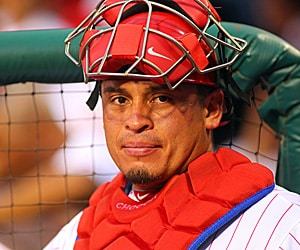

Ruiz crouched down that night, May 12, 2006, to catch his fourth game. His pitcher that evening in Cincinnati was throwing his first game. His name: Cole Hamels.
Before that evening was an era of false hope, missed opportunities and disappointing first weeks of October. But that evening, as the Hamels and Ruiz battery made its first appearance, with Ryan Howard, Chase Utley and Jimmy Rollins manning the infield, and with Pat Burrell and Shane Victorino in the outfield, a new era had begun.
Today, with the trade of Ruiz to the Los Angeles Dodgers, we don’t bid goodbye to that golden era of Phillies baseball. That era has long faded away. We do, however, recall a steady force, a true talent, and a comfort to fans and players of the red pinstripes.
Carlos Ruiz was emblematic of the Phillies’ greatest stretch: an intensifying ember, then an exploding star, then a deep, slow fade into the cimmerian midnight.
*****
It took Ruiz some time to develop into the still hand we’ll forever remember. In fact, he only played 27 games in 2006, as Lieberthal, Fasano and Chris Coste took much of the playing time behind the plate. Lieberthal, the truest symbol of those transitional years between 1996 and 2005, represented a franchise unable to secure enough superior talent to contend with top teams.
Those Phillies teams, especially 2001, 2003, 2004 and 2005, fell frustratingly short of the postseason. And the 2006 Phils, which ended the season with Coste and Lieberthal behind the plate (Ruiz joined them on Sept. 1), again dropped from contention late in the season.
Even in 2007, with Ruiz seemingly ready to take over as everyday catcher, the Phillies didn’t feel completely assured with the 28-year-old Panamanian. So Ruben Amaro Jr. signed Rod Barajas, who was more than a standard backup catcher for Ruiz, and on May 23, 2007, failed to block the plate in a crucial late-game moment against the Marlins. So Barajas never warmed himself to Phillies fans. Ruiz, on the other hand, provided just enough offensively and defensively to keep folks happy.
More importantly, his pitchers loved him. Ruiz served as starter throughout 2007 and 2008 mostly because he worked well with Hamels, Jamie Moyer, Kyle Kendrick and company. He didn’t hit well, and in fact was clearly the Phils’ weakest offensive link in 2008.
Then the postseason called.
*****
Two things happened in the 2008 postseason that I still can’t believe. The first is that Ryan Madson almost overnight gained a few ticks in his fastball and became a dominant reliever. The second is that Carlos Ruiz turned into one of the most dynamite postseason hitters in recent history.
That performance seemed to catapult Ruiz. He put up a solid 2009, despite an injury, with a .255/.355/.425 mark and 26 doubles. He continued to swat in the postseason, going 15 for 44 with six extra-base hits. Then, in 2010, he turned into a Most Valuable Player candidate, hitting .300 with a .402 on-base percentage, fueled by his always impeccable eye (Ruiz never struck out more than 60 times in a season).
But 2010 will always be the year that began a beautiful friendship: Roy and Chooch.
*****
I’ll never forget the feeling I had during the second inning of the Phillies’ May 29 game against the Marlins. As nearly all of the Avalon, N.J., bar focused on the Flyers’ Stanley Cup final game, I curiously watched Roy Halladay deliver an easy array of strikes to Ruiz. I called my dad early that night: “You should watch Roy tonight. I feel really good about him.”
Seven innings later Halladay threw his final pitch to Ruiz, a ball hit to Juan Castro that would end the ace’s perfect game.
Less than five months later, in Halladay’s first postseason game, he and Ruiz combined to no-hit the Reds.
Ruiz caught 80 games for Halladay, more than any other catcher. Together they had a 3.23 ERA with 478 strikeouts and 101 walks. To Ruiz, Cliff Lee pitched 74 games, putting up a 2.73 ERA with 515 strikeouts and 85 walks. And then there’s Hamels, who pitched 207 games to Ruiz and had a 3.12 ERA with 1,289 strikeouts and 353 walks. No other catcher has thrown to Hamels more than 27 times.
Hamels finished his Phillies career nine years after it began, on July 25, 2015, against the Chicago Cubs. In his first game Hamels went just five innings, starting that Golden Era with a solid fastball, an outstanding changeup, and poise that would help him become one of the greatest pitchers of his time.
In that final Phillie game, Hamels went out better than anyone could’ve imagined. He threw 129 pitches, struck out 13, walked two, and of course, allowed no hits. His catcher, of course, was Carlos Ruiz.
*****
Hamels may one day be enshrined in the Hall of Fame. Halladay has a good chance. Lee is at least a conversation. Undoubtedly, each of those three owe some of their success to the steady force who crouched 60 feet and six inches from them every five days. Carlos Ruiz wasn’t the greatest hitter. He wasn’t the most nimble defender. But he shared the spotlight during some of the most memorable evenings in Phillies history. He grew into a jake talent who turned it up to 11 when the lights burned brightest. And he was the defining force of the greatest stretch of baseball we’ve seen thus far in Philadelphia.
Ruiz will likely never again play for the red pinstripes at Citizens Bank Park. But, hopefully when that midnight sky is illuminated once again by a blanket of stars, Ruiz will surely have his plaque unveiled among us.